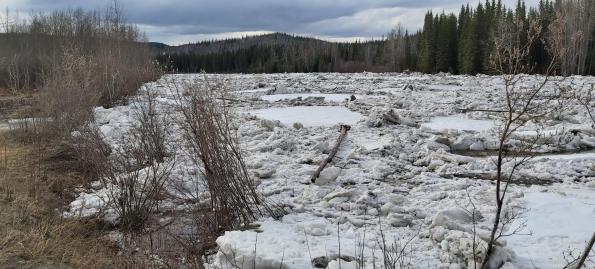 This project addresses relevant and emerging issues related to COVID-19 in Indigenous communities by revealing the health and wellness impacts as described by the citizens of Old Crow, with funding from the Canadian Institutes of Health Research, and in partnership with the Vuntut Gwitchin First Nation.
This project addresses relevant and emerging issues related to COVID-19 in Indigenous communities by revealing the health and wellness impacts as described by the citizens of Old Crow, with funding from the Canadian Institutes of Health Research, and in partnership with the Vuntut Gwitchin First Nation.
COVID-19 has had a significant impact on the world, Canada, and local communities, impacting the health and wellness of countless people. This is also true for Indigenous Peoples in Canada. Early in the pandemic, Indigenous communities had lower infection rates due to instituting roadblocks, community isolation and modifying ceremonies and activities within their communities. However, for many years, Indigenous communities have experienced social and economic inequalities due to colonialism. They face health inequities such as a high burden of cardiovascular disease, food insecurity, lack of clean water, trauma etc. These circumstances leave many communities disproportionately unprepared for the COVID-19 pandemic.
This research has been co-created by the community of Old Crow, in partnership with the Vuntut Gwitchin First Nation (VGFN). VGFN have a long history of collaboration in research and have identified concerns within their community related to food security, mental health, substance use and addictions, and the effects of historical trauma on their citizens. This research will identify how the community of Old Crow mobilized and reacted to the pandemic and how COVID-19 restrictions may have impacted the wellness of VGFN citizens while honoring and respecting the wisdom and knowledge of the elders.
The research will be grounded in Indigenous Knowledge and self-determination and will provide a strengths-based approach by illustrating a pro-active, community-led response to COVID-19. Conducting the research in the community and using local community researchers supports existing relationships and trust building, as well as cultural safety. Though Old Crow faces challenges to the health and wellness of citizens, the strengths of this community and collective approach to COVID-19 may support a model for other rural/remote/northern and Indigenous communities in Canada.
The study began in July 2022 in Old Crow with a community gathering and launch. We gathered the experiences and perspectives of 30 Old Crow citizens from September 2022 to August 2023, followed by data analysis. We will also present the results to the community in November 2023, as well as present at the YSPOR Health Summit. A report will be generated for use by the community in accordance with the principles of OCAP.
Dr Liris Smith, Principal Investigator, YukonU Research Centre (YRC), YSPOR Support Unit
Rebecca Hanson, Collaborator, Vuntut Gwitchin First Nation
Dr Michelle Leach, Co-applicant and sex and gender champion, YRC, YSPOR Support Unit
Lorraine Netro, Knowledge Keeper, Vuntut Gwitchin First Nation
W. Wilberforce Obwona Ogaba, Research Professional, YSPOR Support Unit